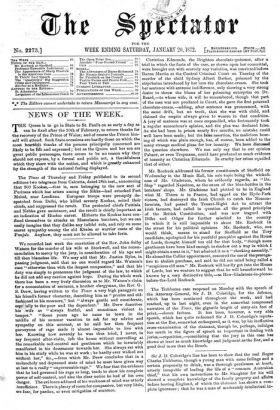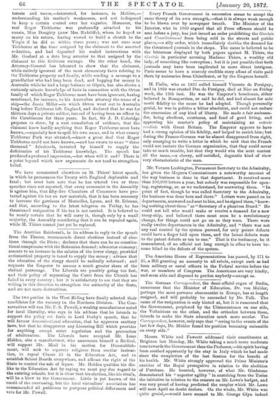Sir J. D. Coleridge's line has been to show that
the real Roger Charles Tichborne, though a young man with some failings and a certain propensity to drink, was a thorough gentleman at heart, utterly incapable of leading the life of a "common Australian thief," that his own instructions to Mr. Slaughter for his will showed a complete knowledge of the family property and affairs before leaving England, of which the claimant has shown a com- plete ignorance ; that he was a man of moderately intellectual in..
terests and tastes,—interested, for instance, in Mo
understanding his mother's weaknesses, and not indisposed to keep a certain control over her vagaries. Moreover, the real Roger Tichborne was profoundly attached to his cousin, Miss Doughty (now Mrs. Radcliffe), whom he hoped to marry on his return, having vowed to build a church to the Virgin if he did so within three years ; was not once near Tichborne at the time assigned by the claimant to the asserted seduction, and had deposited his sealed instructions with Mr. Gosford at a date long anterior to that assigned by the claimant to this fictitious outrage. On the other hand, the Attorney-General has laboured to show that the claimant, while entirely ignorant of the most elementary facts relating to the Tichborne property and family, while sending a message to a grandfather who had long been dead, and begging for money in Australia while he had a large balance at Glyn's, has also shown a curiously minute knowledge of facts in connection with the Orton family of which Roger Tichborne must have been ignorant, having mentioned, for instance, to his Australian attorney the name of a ship—the Jessie Miller—in which Orton went out to Australia long before Tichborne left England, and declared that he was for thirteen days a private soldier, instead of having been an officer in the Carabineers for three years. In fact, Sir J. D. Coleridge proposes to show, by a vast cumulation of evidence, that the claimant knew hardly anything that Roger Tichborne must have known,—especially how to spell his own name, and in what county Tichborne Park was situated,—knew a great deal that Roger Tichborne could not have known,—and has sworn to some "three thousand" falsehoods, invented by himself to supply the deficiencies of his Tichborne knowledge. - The . speech has produced a profound impression,—but when will it end? There is a point beyond which new arguments do not tend to strengthen belief.



































